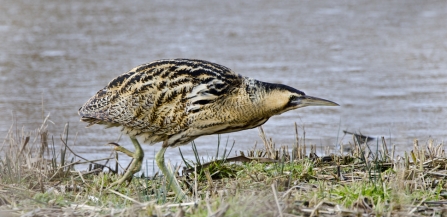However, without legislation to underpin the 25 Year Environment Plan its future success seems limited from the outset. The natural environment is vital to our health and well-being and the 25 Year Environment Plan needs to be embedded across Government departments to ensure that housing, infrastructure, health and education all benefit from having nature properly integrated into their policies. We should be building in nature, not building on it. We hope that the Government will embrace the growing body of evidence which supports the value of the natural environment, and works with organisations like the Wildlife Trust to realise its vision of leaving the environment in a better condition for the next generation. We must have cross-party support and legislation if this plan is going to be implemented over the next 25 years – we must guard against a change of mood in a few weeks, months or years if these promises are to become a reality.
Reflecting on the 25 Year Plan

David Tipling 2020Vision
State of nature
Wildlife in the UK is facing unprecedented challenges. The ‘State of Nature Report’ published in 2016 showed that 56% of all the species studied have declined over the last 50 years and 31% have declined strongly. More than one in ten are thought to be under threat of extinction in the UK. UK wildlife is in severe decline because of a range of issues of which the most important and systemic issues are intensive agriculture, damaging development, atmospheric nitrogen pollution, resource depletion (especially industrial fishing at sea) and climate change. Well managed conservation projects are successful and can reverse species and habitat decline. For example, red kite have been successfully reintroduced into England whilst the decline of bittern has been arrested and reversed through habitat creation of reed-bed. However, the network of protected areas and nature reserves is inadequate to stem local extinctions that are driven by habitat fragmentation.
Opportunities in the face of development pressure
Warwickshire, Coventry and Solihull faces unprecedented levels of development pressure with the UK housing crisis, expansion of warehousing and distribution centres and HS2 which will change our local area forever. Warwickshire Wildlife Trust recognises that people need somewhere to live and that in a modern society transport and commerce needs to function effectively to enable people to go about their daily lives. However, with all of these developments there should be significant consideration given to the impact on the existing wildlife, landscape and local communities, along with foresight into what future generations will inherit. Without due consideration we face the real possibility of losing some species forever and letting future generations inherit a degraded, fragmented and disconnected natural landscape that fails to support wildlife or people. With that scenario comes the real likelihood of inherited social problems with communities disconnected from the natural environment and facing issues such as obesity, mental health problems and a lack of community cohesion.
Whilst the worst case scenario does not paint a good picture, there is another way. The Wildlife Trusts set out a vision in our new vision for UK housebuilding, a vision which enables developers to consider the added value that natural environment can play, utilising it as a benefit, rather than seeing it as a constraint. We are pushing the Government hard to strengthen its 25 Year Environment Plan by underpinning it with legislation which will ensure that future development fully integrates sustainability into its plans. In Warwickshire we are calling for developments to give more back to nature than they take, what is referred to as ‘net gain’. We are working hard to influence developers, Local Authorities and policy makers to ensure that a longer term view is established that seeks to avoid the potential time bomb for both wildlife and people.
Creating networks for nature
Over the last 50 years intensification of agriculture, development and lack of management of wild spaces has fragmented what was once a connected landscape. Warwickshire Wildlife Trust’s vision for a Living Landscape; creating bigger, better and more joined up areas for the benefit of wildlife and people looks to reverse that trend. Small isolated ‘wildlife havens’ surrounded by agricultural land, urbanisation or transport infrastructure can be linked up by creating connections in the form of hedgerows and wild flower verges. These along with other sites such as wildlife gardens, allotments and parks that act as ‘stepping stones’ in the landscape can enable species to move at a landscape scale. That’s important because it makes them less at risk of local extinctions and more robust in the face of climate change. For people it increases the likelihood of connecting with nature in our daily lives, resulting in positive impacts to our health and wellbeing and a greater understanding of where our food comes from and the role the natural environment plays in helping to prevent flooding, mitigate the effects of climate change and improve our air and water quality. Education plays an important part in teaching future generations about the importance of the natural environment, but we also need to influence decision makers now.
Action needed now
We are now calling for the Government to go further and introduce an ambitious new Environment Act in the next Queen’s Speech, committing this and future governments to the actions that are needed. As the UK moves towards a post-Brexit era there is a once in a life time opportunity to recognise the value that the natural environment plays in our daily lives. The creation of 25 Year Environment Plan is an excellent step forward but without legal underpinning it will struggle to deliver on its ambitious content. We are now at a critical point in time which not only affects us but the generations to come. We must act with determination to create a sustainable future in Warwickshire, Coventry, Solihull and the whole of the UK. Your local Wildlife Trust will continue to campaign for positive change and we hope that you will support us.

